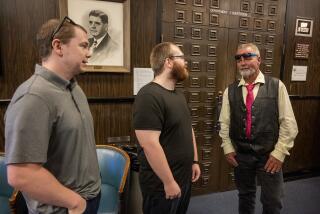Ore. Court Decides to Free Death Row Inmate
- Share via
GRANTS PASS, Ore. — A man convicted of raping and killing a 2-year-old girl will be freed from death row barring the slim chance the state Supreme Court reconsiders its ruling that the state harmed his defense by taking five years to bring him to trial.
In a 5-1 decision Thursday, the court ruled that the delay violated the Oregon Constitution’s guarantee of a speedy trial and made it difficult for Scott Dean Harberts to defend himself. The court ordered the charges dismissed with prejudice, meaning they cannot be refiled.
“I can’t believe this,” said Debra Holfeld, mother of 2-year-old Kristina Lynn Hornych, who died in 1989. “A little baby killer gets out scot-free.”
It will take up to a month for a final judgment to be filed, but defense attorney Eric Cumfer said his client will be freed. He said there was “serious doubt” about Harberts’ guilt.
The state has 21 days to decide whether to petition the Oregon Supreme Court to reconsider its own ruling, said Peter Cogswell, spokesman for the state attorney general.
Cumfer and Cogswell said they could not remember a case in Oregon in which someone on death row had been freed.
Since the death penalty was reinstated in 1984, some convicted killers have had their sentences changed to life in prison. Before that, one woman convicted of murder had her death sentence commuted to life in prison by the governor and years later was freed on parole.
Harberts was convicted in 1994 and sentenced to death in the slaying of Kristina, who died of head injuries in her Oregon City home. At the time, Harberts was living with the girl’s father, Kevin Hornych, and Hornych’s girlfriend.
Harberts argued that the father and perhaps the girlfriend killed the child.
Justice Susan M. Leeson said prosecutors delayed the trial by bringing an unjustified second appeal of a judge’s decision to throw out statements Harberts made in connection with a polygraph test.
During the five-year delay, one of the detectives died, making it impossible for Harberts to question him about the investigation, the ruling said.
The delay also made it possible to discount discrepancies between Hornych’s and his girlfriend’s stories at the time of the slaying and at the time of the trial.
More to Read
Sign up for Essential California
The most important California stories and recommendations in your inbox every morning.
You may occasionally receive promotional content from the Los Angeles Times.













